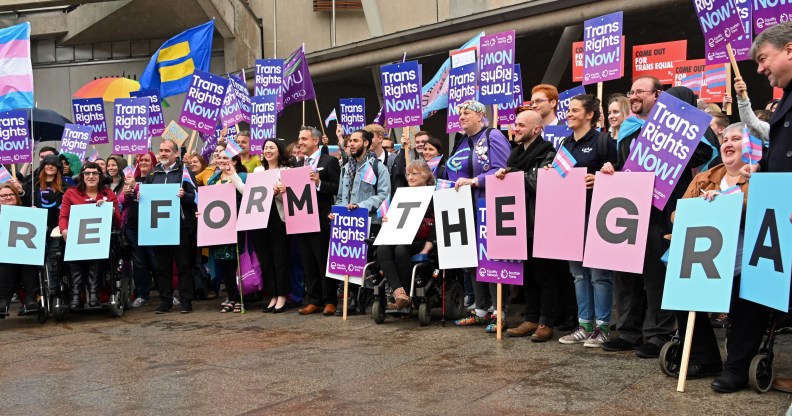This is what women’s groups really think about reforming Scotland’s gender recognition laws

Protesters demonstrate outside the Scottish Parliament for reform of the GRA on June 12, 2019 in Edinburgh. (Ken Jack/Getty Images)
Women’s organisations across Scotland strongly back reforming gender recognition laws.
The Scottish government’s public consultation on the Gender Recognition Bill closes in three days.
The draft bill outlines reforms to gender recognition laws that will streamline and modernise the process by which trans people can update the gender on their birth certificates – a right the trans community in the UK has had since 2004.
Despite claims from a small group of online “gender critical” activists that women are being silenced in the conversation around potential reforms, women’s organisations across Scotland have already had their say on the proposed changes – and they strongly support reforming Scotland’s gender recognition laws.
Women’s groups responded positively to Scotland’s first public consultation on reforming the Gender Recognition Act (GRA), which was open from 9 November 2017 to 1 March 2018.
There were 15,697 responses, and 60 per cent of people who responded – rising to 65 per cent of people based in Scotland – said they backed plans to introduce a self-declaratory system for legal gender recognition.
Women’s organisations in Scotland, including Close the Gap, Engender, Equate Scotland, Rape Crisis Scotland, Scottish Women’s Aid, Women 50:50 and Zero Tolerance, released a joint statement supporting a self-declaratory system for legal gender recognition in response to the consultation.
“We do not regard trans equality and women’s equality to contradict or be in competition with each other,” the joint statement said.
The statement was organised by services who support women who have experienced sexual or domestic violence, as well as organisations that campaign for gender equality more broadly.
“The complexity, restrictions and expense of the current gender recognition process particularly discriminates against trans people who are disabled, migrant, minority ethnic, unemployed, homeless, fleeing domestic abuse, young or non-binary.
“Enabling trans people to smoothly change their birth certificates at the same time as they change their other identity documents is a much needed positive step forward for society,” the statement said.
Despite support from women’s organisations, in July 2019, the Scottish government responded to pressure from a small group of anti-trans activists and said it was delaying plans to reform the GRA and would instead hold a second public consultation on the proposed changes.
This would allow time to conduct an equality assessment to determine whether changes to the GRA would impact on women’s rights – in response to pressure from anti-trans lobby groups.
The equality assessments, published by the Scottish government alongside the draft bill containing GRA reforms in December 2019, flatly rejected claims that gender-recognition reform would impact women’s rights or present a risk to single-sex spaces.
The existing 2004 law and the draft bill both only govern the process for updating the gender of trans people on their birth certificates. Most other documents already operate on a self-declaratory basis, while discrimination laws apply to all trans people regardless of gender recognition status.
